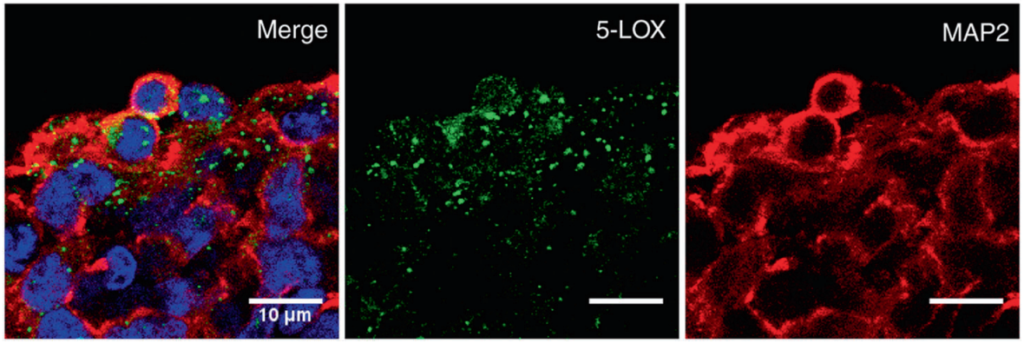- PT
- |
- EN
 A study with the participation of IDOR discovered positive actions of lipoxin A4 on cognitive brain functions and the endocannabinoid system.
A study with the participation of IDOR discovered positive actions of lipoxin A4 on cognitive brain functions and the endocannabinoid system.
Researchers from the D’Or Institute for Research and Education (IDOR) have just published a study in the scientific journal Translational Psychiatry that sought to elucidate the mechanisms involved in cognitive deficits in human aging, considering the action of molecules that can combat inflammatory processes in diseases neurodegenerative diseases such as Alzheimer’s, and potentiate the endocannabinoid system. This substance, known as lipoxin A4, has been studied by researchers for years and this is the first application against neurodegenerative diseases linked to aging, with potential consequences in the diagnostic field. This study was carried out in partnership with the Oswaldo Cruz Foundation (Fiocruz), Federal University of Rio de Janeiro (UFRJ), Federal University of Espírito Santo (UFES), Federal University of Latin American Integration (UNILA) and The Broad Institute of MIT and Harvard.
Inflammation is part of the body’s defense, but its unregulated action plays an important role in chronic and neurodegenerative diseases, including Alzheimer’s. The control of the inflammatory response occurs, among other factors, by lipid mediators such as lipoxins, which act in the natural resolution of inflammation. For example, when a broken skin “heals itself,” we are watching these molecules in action. This active protection also takes place in the central nervous system, but it is more difficult to visualize. The central hypothesis of the published work is that the loss of this control could lead to chronic inflammatory problems and, ultimately, to neurodegeneration.
The main interest of the study was to understand the natural dynamics of the reduction of lipoxin levels that occur in the body during aging, a phenomenon that could be related to the body’s vulnerability to neurodegenerative diseases.
Bearing in mind that the effects of lipoxin A4 (LXA4) on the brain were not very clear, the study evaluated the possible actions of this bioactive on the brain environment and its activity, correlating it mainly with advancing age in organisms. The scientists evaluated the molecule presence in the brain of mice, in human neural cells developed in the laboratory, and in the cerebrospinal fluid (CSF) – fluid present throughout the nervous system – extracted from elderly patients with proteins and other neurodegenerative diseases. This was the first study to demonstrate the origin of LXA4 in the central nervous system, pointing to its presence in neurons and microglia (inflammatory cells) of humans and mice. Laboratory-developed brain organoids, which have a biochemical profile and structural organization similar to the human embryonic brain, were also used to confirm this information.
In addition, immunofluorescence (another technique that allows the evaluation of antigen distribution in a sample) demonstrated the presence of 5-lipoxygenase (5-LOX), the enzyme responsible for the production of LXA4 in brain organoids (Image). This dataset raises the possibility that neurons and microglia are involved in the supply of LXA4 to the human brain.
Until then, there was controversy in the scientific literature, with another research group associating the presence of 5-LOX with the synaptic dysfunction observed in animal models of Alzheimer’s disease. The current study proposes the opposite and clarifies that the lipoxin produced by 5-LOX directly in the brain is an aspect that contributes to neuroprotection.

Image 1: Representative image of the experiment with human brain organoids. In green, it shows the presence of 5-LOX. In red, MAP2 (microtubule-associated protein 2, essential for the structure of neuronal cells). In blue is the nucleus of these cells.
In research with mice, the focus was to understand, in an animal model, the relationship between LXA4 and the aging process, with the hypothesis that levels reduced of this substance would weaken the body’s defenses, making the brain vulnerable to neurodegeneration. It was observed that LXA4 levels in blood plasma and the brain were reduced in 12-month-old (“senior”) mice compared to 3-month-old (“young adult”) mice. In older mice, a reduction in learning ability and short-term memory loss was also demonstrated, indicating that reduced levels of LXA4 are accompanied by cognitive deficits in older animals.
“This study makes an important contribution in establishing the local presence of lipoxin in the central nervous system, as well as the decline in its levels throughout aging, something that had long been debated by the scientific community. Along with the previous article by our group, we were able to define that this substance is a very important anti-inflammatory protection factor in the human brain, probably preventing the occurrence of neurodegeneration in individuals who age healthily” mentions Dr. Fabrício Pamplona, researcher at IDOR, UNILA and main author of the article.
The study also evaluated whether injecting LXA4 could have a protective effect against memory changes induced by an inflammatory lesion in mice. It was observed that after seven days of injection with LXA4 there was a cognitive stabilization and reduction of inflammatory molecules in the blood plasma of rodents, which led researchers to evaluate the relevance of this lipoxin in humans with different diagnoses of neurological impairment resulting from dementia and/or neurodegeneration.
In this experiment, it was observed that LXA4 decreases proportionally in CSF according to aging and the severity of patients’ cognitive impairment. In other words, the older and more cognitively impaired, the lower the level of LXA4 in the CSF. The decrease of LXA4 in the CSF was also related to the accumulation of beta-amyloid protein (Aβ42) in the brain, one of the neurotoxic markers of Alzheimer’s disease.
An interesting novelty of this study is that LXA4 has an innovative mechanism involving a potentiation of the endocannabinoid system. This system promotes the balance of the organism (known as homeostasis), finely controlling neurotransmission, and impacting a series of physiological processes ranging from appetite control, hormone release, cognition, pain, and inflammation, among others. According to the research line of the group, LXA4 promotes a neuroprotective action via direct interaction with cannabinoid receptors of the CB1 type, generated in a better transmission of the endocannabinoid anandamide.
“CB1 receptors are key to the endocannabinoid system, which fine-tune the brain’s neurotransmission systems. Knowing that lipoxin promotes activation of the endocannabinoid system, as we have already characterized in another study, the information that it is produced and released by immune cells in the brain (microglia), allows us to place its action in a scenario of interaction between the nervous system central and immune system. This regulation is another key role of the endocannabinoid system, showing that inflammatory balance is essential for our brain health, particularly during aging” emphasizes Pamplona.
Thus, LXA4 would be a naturally occurring substance with dual action, anti-inflammatory and protective, whose decline during aging would cause a “vulnerability” of the brain to neurodegeneration. The findings indicate that prevention against the decrease of LXA4 can preserve the health of the brain environment and cognition, in addition to being an important discovery for development future therapies aimed at neurodegenerative diseases. The authors report that further studies are needed to clarify the mechanisms of LXA4 activation and to assess how stimulating the production of this molecule could be effective in slowing down cognitive decline in the elderly population.